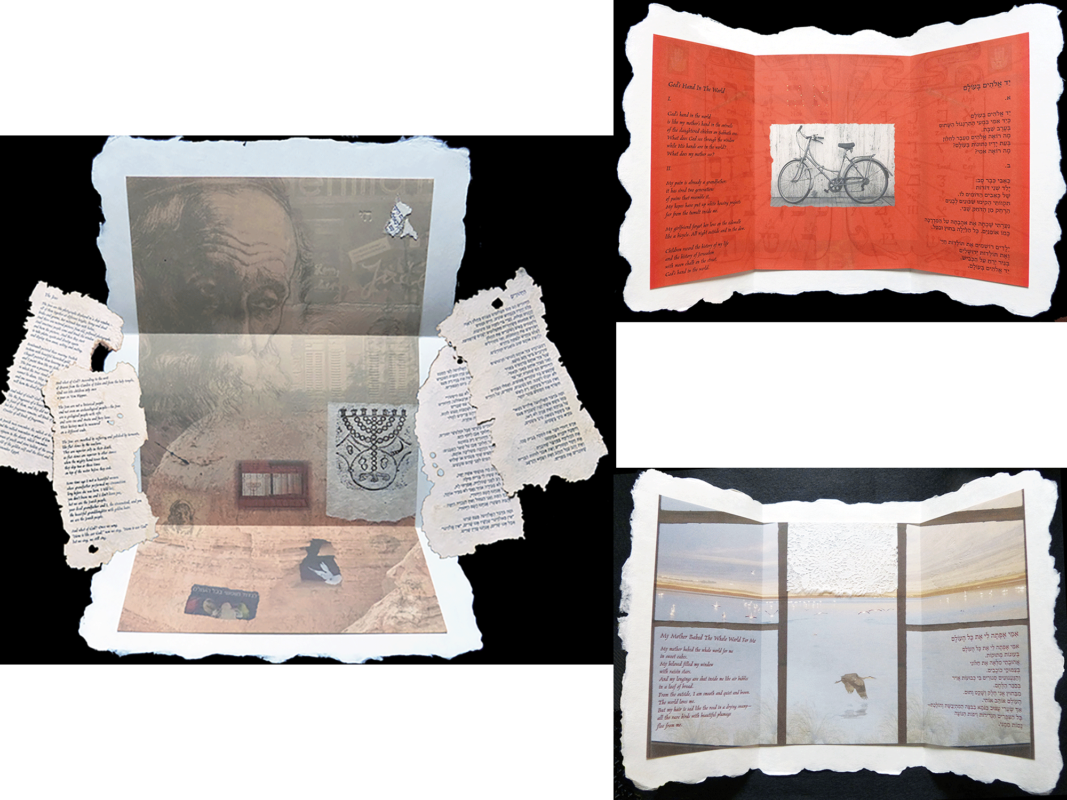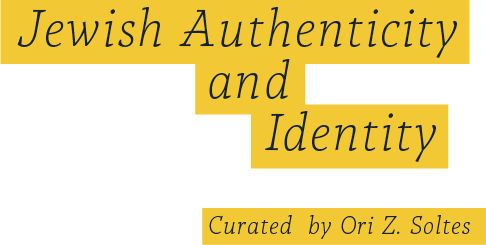
“The Amichai Windows, God’s Hand in the World,” Rick Black, 2017, digital print in triptych with letterpressed poem, 21 x 13 inches fully opened, unframed
“The Amichai Windows, The Jews,” Rick Black, 2017, digital print in triptych with letterpressed poem, 13 x 21 inches fully opened, unframed (plus poems with burned edges)
“The Amichai Windows, My Mother Baked the Whole World For Me,” Rick Black, 2017, digital print in triptych with letterpressed poem, 21 x 13 inches fully opened, unframed
Each central panel is typically layered with multiple collage elements, interweaving archival photos that resonate from the Jewish historical and art historical experience with blind embossments and botanical tip-ons and gold-leaf embellishments. Menorah images from ancient mosaic synagogue floors contend with sweeping vistas of the Hula nature reserve in northern Israel—and bicycles; delicate fragments of white lace and papercut page edges that offer a stylized Jerusalem skyline contend with blood red pages subtly embossed with the letters of the Hebrew alphabet.
The ten-year-long project of translation, research, design, letterpress printing, and hand bookbinding opens a window—hence the title—into the mind of the poet whose poetry opens windows onto human-shaped love and war, and onto Jewish identity, particularly as it has been reshaped by the experience of a Jewish state. The underlying conceptual structure of the work reflects not only the notion that “18” is “life”—observed, here, through the windows of Amichai’s poetry—but the fact that “hai” is the last syllable in the poet’s name, which, in its entirety, means “my people lives!”
The conceptual centerpiece of that living is Israel itself, and—at least some would argue—within Israel, the remarkable city of Jerusalem, with its archaeological roots planted deep beneath the surface, and carrying back to and beyond the time of King David. The city and its inhabitants encompass extremities of sacred and profane reality, of human encounters with each other and with God. The spiritual importance of Jerusalem for Muslims is the Dome of the Rock, marking the place where, according to Muslim tradition, Muhammad ascended to heaven for a conversation with God; for Christians, the Church of the Holy Sepulcher, where many believe that Jesus was laid to rest, is the most important location. For Jews, it is the Kotel haMa’aravi—the remaining part of the western retaining wall mainly built by King Herod in 19-9 BCE to support the expanded platform of the Temple. That fragment of wall is as close as Jews have managed to get for most of the past sixteen centuries to where the Temple itself may have stood.
Rick Black is an award-winning book artist and poet. His artist books are represented in private and public collections, including the Library of Congress, Yale University and the U.S. Holocaust Memorial Museum. A journalist for many years, Rick worked overseas for three years in the Jerusalem bureau of The New York Times. While he enjoyed reporting, he was intent on pursuing his love of literature and books. He studied at the Center for Book Arts in New York and Pyramid Atlantic in Maryland, and eventually founded his own imprint, Turtle Light Press. In 2017, he completed “The Amichai Windows,” a ten-year project of translation, research, design, letterpress printing and hand bookbinding. A collection of 18 poems by renowned Israeli poet Yehuda Amichai, “The Amichai Windows” opens a window onto love, war, and being Jewish today. In 2019, Rick received the Isaac Anolic Jewish Book Arts Award. To learn more about “The Amichai Windows,” visit www.amichaiwindows.com. You can keep up with Rick’s other writing projects at www.turtlelightpress.com and www.israelhaiku.com.

